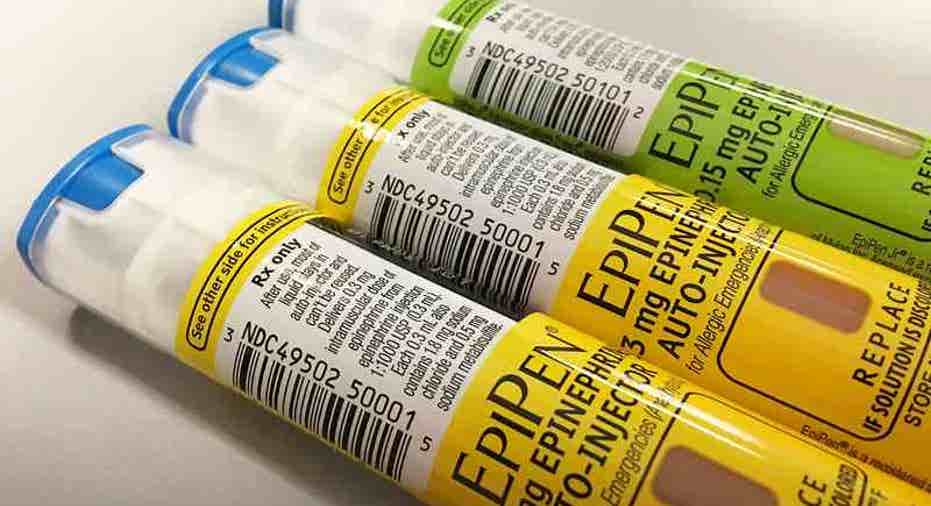Mylan Executives Unlikely to Lose Pay Over EpiPen Issue

Executives of EpiPen maker Mylan NV are unlikely to suffer a reduction in their pay from the company's recent $465 million settlement of allegations that it improperly overcharged Medicaid for the lifesaving drug.
That is because Mylan historically has calculated executive pay using a nonstandard measure called "adjusted diluted" earnings, which excludes the costs of such litigation settlements, the company's regulatory filings show.
The settlement with the federal government, announced by Mylan earlier this month but not yet finalized, comes amid continuing public and congressional scrutiny of Mylan over steep price increases on EpiPen, its treatment for severe allergic reactions, and the separate but related issue of its Medicaid charges for the drug.
The cost of the Medicaid settlement is substantial for Mylan -- more than double the company's pretax earnings for the first six months of 2016.
Mylan declined to comment. The company previously said the settlement with the government included no finding of any wrongdoing on the part of the company or any employees.
Mylan recently gave updated earnings guidance that made it clear the $465 million expense wouldn't figure into its adjusted diluted earnings for this year.
Numerous companies, including many of Mylan's drug-industry peers, also calculate executive pay using nonstandard earnings measures.
About 400 companies in the S&P 500 reported a form of adjusted net income in 2015, and just over a quarter of them omitted legal charges and gains, according to an analysis by Jack Ciesielski, publisher of Analyst's Accounting Observer.
But some shareholders say Mylan CEO Heather Bresch and other executives -- already among the highest-paid in the drug industry -- shouldn't be insulated from the EpiPen Medicaid imbroglio.
"It would be grossly inappropriate for Mylan to exclude the cost of this penalty when determining incentive pay for top executives," said New York City Comptroller Scott Stringer, who oversees pension funds holding more than one million Mylan shares. "The executives enjoyed lucrative payouts in the past for performance that turns out to have been based on improper conduct, and the company and its shareowners are now suffering the consequences."
Counting the settlement cost would cut about 12% off adjusted earnings this year, estimated Ronny Gal, an analyst with Sanford C. Bernstein. That could put a crimp in the paycheck of Ms. Bresch, who earned $18.9 million last year, of which $3.9 million was a bonus based in large part on adjusted earnings performance.
Late Wednesday, Sen. Charles Grassley (R., Iowa), said that his Senate Judiciary Committee would hold a Nov. 30 hearing on Mylan's Medicaid settlement, saying, "Americans deserve to know what the government is doing to hold Mylan accountable, recoup lost tax dollars and prevent similar behavior in the future."
Mylan's settlement comes after senators and federal health officials alleged the company wrongly classified EpiPen as a generic for the purposes of figuring rebates owed to Medicaid, even though it is considered a brand-name drug by the Food and Drug Administration.
That let Mylan have it both ways: The company could reap large profits from the patent-protected drug in the broader marketplace, while paying rebates to Medicaid at a substantially reduced generic rate. Medicaid, a health program for low-income individuals, is funded jointly by states and the federal government.
Federal health officials have said they "expressly told Mylan that the product is incorrectly classified" as a generic, although when that warning was made is unclear.
In announcing the settlement, Mylan said it had classified the drug as a generic "based on longstanding written guidance from the federal government" dating to before Mylan acquired EpiPen in 2007.
Over the past five years, Mylan's "adjusted diluted" earnings have averaged 85% higher than its earnings reported under generally accepted accounting principles, filings show. In the first half of this year, adjusted earnings were five times GAAP earnings of 36 cents per share.
Mylan's top executives were paid nearly $300 million in aggregate over the past five years, second highest for the drug industry.
Earnings adjustments for executive pay are spreading. More than half the companies in the S&P 500 cited "non-GAAP" results in their proxies this year, up from 27% five years ago, research firm Audit Analytics found this spring.
Across the S&P 500, adjustments increased reported earnings by 42% in 2015, or 20% excluding the volatile energy sector, Mr. Ciesielski said.
There is nothing improper about this, as long as the metrics are adequately disclosed. And some specialists favor adjusting results to determine pay, eliminating nonrecurring or unusual costs, because shareholders want to tie incentives to ongoing operations.
Boards can change incentive formulas and typically have discretion to reduce pay below formulaic results, said Steven Hall, managing director of compensation consultancy Steven Hall & Partners. "In the majority of the cases I see, the board has the ability to say, 'Stop, you don't deserve this.' "
Companies can also seek to recoup earlier pay, as Wells Fargo & Co. did before its CEO's recent departure amid controversy over the bank's sales practices, though that is rare.
Mylan has a limited clawback policy that applies only in the event of "misconduct that causes Mylan to materially restate its financial statements."
Write to Mark Maremont at mark.maremont@wsj.com and Theo Francis at theo.francis@wsj.com



















